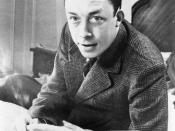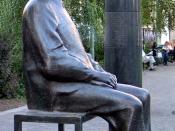On Thursday, November 7, I saw a performance of Baal, written by Bertolt Brecht and directed by Evan Parry. The play was not an emotional play, but an intellectual play. It caused the viewer to think about the existentialist nature of Brecht's writing and the underlying meaning of the play. Although I have studied existentialism and followed the play intently, I still could not fully understand what Brecht was trying to say through Baal. My interpretation is that Baal represents man and his desires and what those desires can lead to.
At the beginning of the play, Baal is in good spirits and loved by all. He has doors open to him; he is asked to publish his poetry and sing his songs at a bar. Through the play, his life gradually becomes worse because he drinks too much and has many girlfriends. People start to dislike him and he loses his apartment.
Then more and more people start to dislike him and he moves from job to job and location to location with nothing but Ekart to see him through. But then he realizes that he is finally in love - with Ekart, but she doesn't love him and makes it obvious by having other men and women in her life. So, Baal kills her since he can't have her for his own. By the end, Baal has nothing but himself to blame for his condition. His drinking problem and his problem of seducing every woman he meets drives him to his death, and causes everyone to repudiate him.
The acting ranged from not-so-great to very good. The only problem was that since not all the actor's names were used, it was difficult to figure out who was who in most cases.
Baal, played by Robert...


